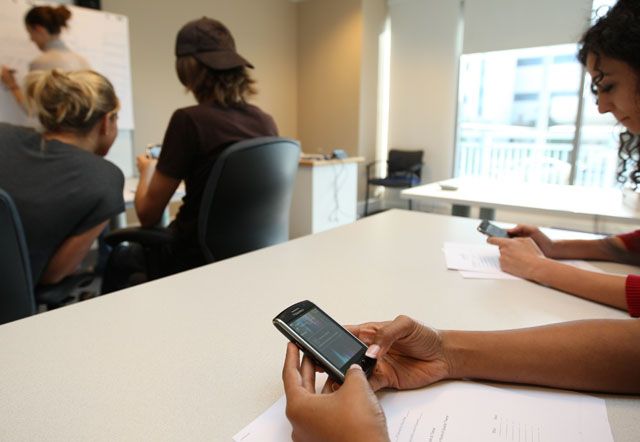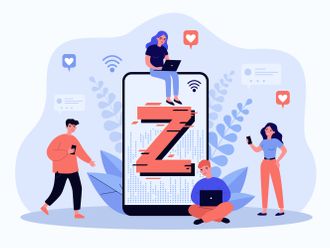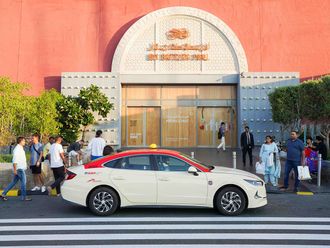Students are coming to class armed with BlackBerry smartphones, which was once exclusive to high-flying executives, to the dismay of universities. Universities are hitting back however. Dubai Women's College (DWC) is exploring the prospect of integrating BlackBerry devices in academics due to what staff have dubbed a "BlackBerry tsunami" descending on the college. The first steps of this initiative have been to grant students access to their university e-mail accounts through their smartphones to remain up-to-date and in communication with their teachers.
"At the beginning of the year we've seen more students with BlackBerrys than ever before," said Mary Lackie, Supervisor of Student Affairs. "We call it the BlackBerry tsunami. It seems like students are everywhere with them."
Isolation
The college, which has always been a mobile phone and portable digital entertainment free zone for staff and students, recently updated its policy to allow the use of mobile phones in the cafeteria, student centre, coffee shops and pick-up bays. As part of DWC's ongoing mobile phone campaign, videos are being shown of what the preoccupation with BlackBerrys can result in.
"We wanted to find a way to be creative in enforcing the policy and update the policy so that it makes sense," said Lackie. The idea, she said, is to point out to students in a fun way, that BlackBerry addiction can ultimately result in self-imposed isolation. So, does BlackBerry addiction, what some websites have coined ‘CrackBerry', exist?
Compulsive behaviour
Annie Crookes, senior psychology lecturer at Middlesex University Dubai, said as a lecturer it is frustrating when students tap away on their phones during class. "For the most part we try to ban the use of these items during class time."
She added that it implies they are not listening, or have "somewhere better to be", in which case it is preferable they do not attend the lecture at all.
However, psychological literature would not formally apply the term ‘addiction' to such behaviour, she said. There is nonetheless a growing interest in the world of psychology regarding the constant use of technology and how these devices enable humans to stay constantly connected. "We also bring our private and social lives into contexts like work and study where previously you would have to wait until you got home, separating your work and private life," she said.
Clinical psychologist Dr Saliha Afridi said the human brain is easily hooked onto the use of technology. "When we think of addiction, we most often think of drugs or alcohol, but technology addiction is a new form of compulsive behaviour," she said.
Impossible to ignore
Afridi said people have reported feelings of tension when they see the light blinking on their Personal Digital Assistant (PDA) — a term now used for anything ranging from mobile phones and laptops to portable media players. "When they pick it up there is a sudden release and rush felt after they answer the e-mail or check the message." The feeling is similar to those drug addicts report when in search of their next "hit", Afridi explained.
As if to second this notion, Dalia Fares, a business student at the American University of Sharjah, said that once she sees her BlackBerry flashing red, indicating a new message, it is next to impossible to ignore it. She said to avoid using her device in class she turns the phone over but ends up "turning it right back after five minutes tops".
Afridi said this compulsion is triggered by the neurotransmitter dopamine. "Dopamine is responsible for the euphoria people feel when they are seeking their drug of choice," she said. "So whether it's an illicit drug, a video game or a BlackBerry e-mail, the same neural pathways in the brain are at work."
Wasting time?
Habiba Al Abdouli, president of the DWC Student Parliament, said most students own a BlackBerry. "It has come with the swine flu, this BlackBerry flu."
The craze may also have something to do with the creative covers that students can opt for to suit their personal style she said. "They want to show off here I guess."
Habiba, who does not own a BlackBerry, said there is an evident break in communication among students in college. "Before, we used to sit as a group talking; now students are always on their BlackBerrys even if we are sitting in a group."
"It's all about jokes and rumours and stupid things," she said, referring to the BlackBerry Messenger service that allows users to connect to other users worldwide for free. This evidently works out to be a much cheaper way of communication.
She relayed one instance when students shocked the teacher by looking up answers to questions asked in class on the device. "They don't do work; they are not thinking or using their brains, which defeats the purpose of college."
- With additional reporting from AUS student Sarah Jimaa
Are you addicted?
If you meet five of the following symptoms you may need help:
- Do you feel preoccupied with technology?
- Do you feel the need to use technology for increasing amounts of time in order to achieve satisfaction?
- Have you repeatedly made unsuccessful efforts to control, cut back or stop internet and technology use?
- Do you feel restless, moody or depressed when attempting to cut down or stop internet and technology use?
- Do you stay online longer than originally intended?
- Have you jeopardised or risked the loss of significant relationship, job, educational or career opportunities because of the internet?
- Have you lied to family members, therapists or others to conceal the extent of your internet and technology use?
- Do you use the internet and technology as a method of escaping problems or relieving sadness?
- Internet Addiction Diagnostic Questionnaire by Dr Kimberly Young













